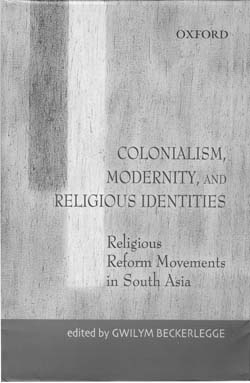The work under review is the third of a series of works focusing on religious reform in South Asia. The two preceding volumes in the same series, both edited by Antony Copley, were titled Gurus and Their Followers and Hinduism in Public and Private and brought out in the years 2000 and 2003 respectively. Some papers included in the present collection, one gathers, were originally presented at the University of Heidelberg in the year 2002 by a specialist panel. To these have now been added suitable contributions from scholars associated with cognate panels. The essays included in the present volume have been schematically divided under two sections. The first of these is called ‘Competition, Institution-building and the formulation of religious identities’ and the one that follows, ‘Responding to Colonial Modernity’. By and large this is an apt and useful schematic structure to have been used. Also, in so far as one can notice, there are about an equal number of papers on Hindu and Muslim reform. This has lent to the present volume an internal thematic balance though for a work that claims to cover all of South Asia, the historical experiences of several other religious communities for the same period have been omitted.
However, this is not a failing that affects this particular collection of essays any more than it has affected other comparable works in the past. In the context of this particular collection perhaps a more just criticism might be that in his otherwise very useful editorial intervention, Beckerlegge does not sufficiently address the problem of just how to distinguish religious reform from the social. This makes the subtitle to this work somewhat misleading, collapsing the possible nuances within the larger project or paradigm of reform.

